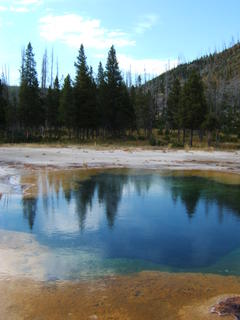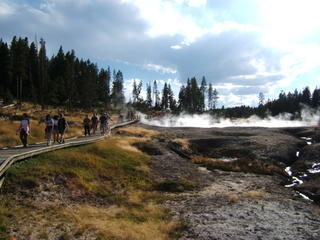Home again, home again...
 I'm home... Perhaps some of you didn't know I was gone? Well then - let me fill you in:
I'm home... Perhaps some of you didn't know I was gone? Well then - let me fill you in:Last week I had the incredible privilege of being picked to be a part of ACCESS VIII and the GRC, which respectively stand for "Atmospheric Chemistry Colloquium of Emerging Senior Scientists" and "Gordon Research Conference". The former is an opportunity for recent and soon-to-be recent PhD graduates in atmospheric chemistry-related fields to meet together, discuss our research, socialize and schmooze with a number of US agency reps (read: NASA, NSF, DoE and NOAA big-spenders) for three days prior to the Atmospheric Chemistry GRC, which happens immediately following ACCESS. These happen every two years, with the last two GRC meetings (2003 and 2005) taking place at Big Sky in Montana, and ACCESS in Yellowstone Park (Wyoming). For the record, I owe a huge thank you to my good friend Alex Thompson, who attended both ACCESS and the GRC two years ago and basically insisted that I apply this year. Cheers, Alex!
 I've never been to either Montana or Wyoming, and I was absolutely in awe... Yellowstone is beautiful (all three photos shown here are from Yellowstone Park), and has an incredible number of stunning and amazing sights and wildlife. I really can't do them justice to describe them, but if you're interested, you can check out the rest of my pictures on the Shoppers site (along with some lengthy descriptions.) A warning - there are a LOT of pictures... my apologies to those of you with slow internet access.
I've never been to either Montana or Wyoming, and I was absolutely in awe... Yellowstone is beautiful (all three photos shown here are from Yellowstone Park), and has an incredible number of stunning and amazing sights and wildlife. I really can't do them justice to describe them, but if you're interested, you can check out the rest of my pictures on the Shoppers site (along with some lengthy descriptions.) A warning - there are a LOT of pictures... my apologies to those of you with slow internet access.The truth is, I don't know which was more exciting - ACCESS and Yellowstone or the GRC part of the week. The format of a GRC meeting is such that I not only got to listen to some of the best and brightest in our field during the morning and evening sessions, but because we are a relatively small group (conference-wise, at ~160 people), eating, sleeping and living in an environment not unlike a high school youth retreat, there were numerous opportunities for interaction with more established scientists throughout the week. As members of ACCESS, we were like the "new elite", and thus we garnered almost as much attention as those giving talks. The conversations over dinner often broke out into scientific discussions of the state of the world (and our futures), sometimes even in the absence of "current" senior scientists...
 It occurred to me today while I was reading my friend Rhian's blog that many of you probably don't really know what it is that I and other atmospheric chemists actually do with our time. She explains it much more eloquently than I can, but essentially, we study the gas-phase and aerosol (gas-liquid and gas-solid) chemistry that occurs in the complex mixture of the atmosphere.
It occurred to me today while I was reading my friend Rhian's blog that many of you probably don't really know what it is that I and other atmospheric chemists actually do with our time. She explains it much more eloquently than I can, but essentially, we study the gas-phase and aerosol (gas-liquid and gas-solid) chemistry that occurs in the complex mixture of the atmosphere. There are two major foci for current research: climate change and air quality. The first talk of this year's GRC contrasted the issue of climate change to the Antarctic ozone hole. Unlike the relatively straightforward job of assessing the causes and establishing a workable solution to the ozone hole issue, the difficulty of interpreting and reporting on climate change is that it isn't as easy to identify direct causes, model anthropogenic v. natural impacts, and develop a reasonable plan for what we can do to stop the impact we as humans are having on our world. Climate change is more than just the greenhouse effect. It involves such a vast array of factors that are barely understood (if at all) and much more difficult to model than the ozone issue ever was. Is it happening? Definitely... Why? Well... on a basic level, it has to do with what we (humans) are doing to our atmosphere that is causing our climate to change at an seemingly unprecedented pace. What can we do to stop it? Hard to say. I think it's even harder to implement. Just ask the people in charge of Kyoto.
As for air quality, atmospheric scientists are mostly concerned with the increasing number of megacities (> 10 million people) - only 4 in 1975, currently 16, and 20+ by 2015, mostly in less-developed nations. Problems such as ozone (near the surface, ozone is bad, in the ozone layer in the stratosphere, ozone is good - I know, it's complicated), fine particulate matter and NOx are some of the the bigger issues in urban air - typically related to adverse health effects. This is the focus of my current research, as I prepare for a field study that will look at impact of the urban outflow (polluted air) of Mexico City as it is transported into the surrounding regions. As chemists, we are looking at the major factors involved in the chemistry of this polluted air mass, to determine the impact it has downwind of Mexico City. Perhaps someday this work will help us to better understand the complex chemistry of urban air in such a way that it will enable policy makers to do their jobs more confidently.
It certainly is an interesting ride. We don't have all the answers. If we did, I wouldn't have a job. For now, I'll keep toiling away in my corner of the field, feeling a little more confident that what I'm doing can fit into the big picture and maybe someday make a difference.

1 comment:
It's great that you were able to connect with other people researching in your field. I am sure working in a lab can make you feel kinda disconnected from the big picture.
Environmental issues are very complex. It includes so many scientific, social, ecomonic and political aspects.
I think as individuals we do have more power to make changes than we think. But it requires a change of attitude and beliefs about how we live our lives. We consume far too much. And for some reason we think the rules of nature that apply to every other species, don't apply to us.
Human nature is a funny thing. We want so much to fit in, be accepted and look successful, that we are willing to spend our lives working to buy junk that eventually ends up in the oceans and in the air. We are in essence choosing to kill ourselves off.
Eventually we are going to have to get very practical about our survival.
Christian and I often talk about these things. How to simplify and reduce. I know these ways of thinking are foreign to many people. And being thrifty or simplifying is usually not "cool". But really, we aren't in high school anymore. The stakes are a little more important than being percieved as cool.
But like everything in life- it's a process. There are lots of tough decisions. For example - we went to Amsterdam. How much pollution did our flight create? I drive a gas guzzeler because we can't afford a newer car. We live in a three bedroom house when there is just two of us. How much unnecessary energy does that cost? Or what about the family biz? Those trucks aren't exactly ozone friendly.
You can go crazy trying to piece it together. But I don't think that means we don't accept responsiblilty for our livestyles.
There are many things that we can do. Some take more time than others.(Eventually we will own a more efficient car- or maybe not own a car at all.)
Good post and beautiful photos!
Post a Comment